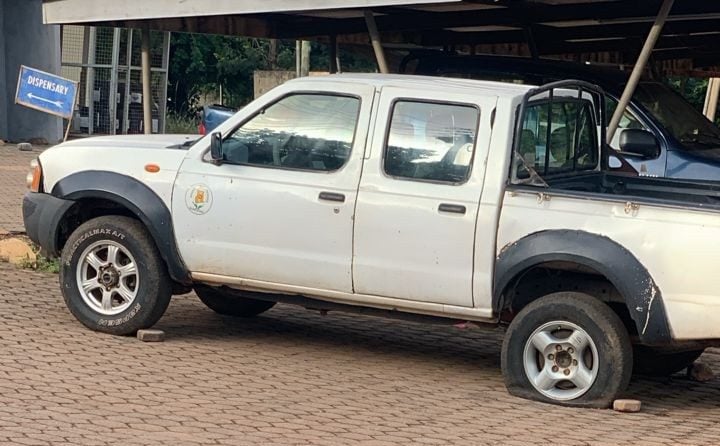The Atua Government Hospital in Ghana’s Lower Manya Krobo Municipality is facing mounting criticism and concern due to the prolonged abandonment of a crucial service vehicle. The vehicle, responsible for transporting medical supplies and facilitating essential hospital errands, has been out of commission for over a month due to a simple tire fault. This seemingly minor issue has exposed deeper concerns about the hospital’s management, maintenance practices, and overall operational efficiency, raising questions about the allocation of resources and the prioritization of patient care.
The vehicle’s immobilization has had a ripple effect on the hospital’s ability to function effectively. Staff members have expressed frustration at the administration’s inability to address this relatively straightforward problem, highlighting the hospital’s reliance on ad-hoc solutions, such as hiring tricycles to purchase fuel for generators during power outages. This makeshift approach not only underscores the critical role of the service vehicle but also paints a picture of a hospital grappling with basic logistical challenges. The lack of a reliable transport system for medical supplies raises serious questions about the hospital’s preparedness to handle emergencies and its ability to consistently provide adequate care to its patients. The reliance on “God knows” as an explanation for how essential supplies are being transported in the vehicle’s absence is particularly alarming, indicating a concerning lack of transparency and accountability.
Hospital Administrator Mr. Vincent Tamakloe acknowledged the vehicle’s tire fault and the delay in its repair, attributing it to bureaucratic procedures and the absence of the medical superintendent. While he assured that repairs were imminent, the protracted nature of such a simple fix speaks volumes about the hospital’s internal processes and its capacity to respond efficiently to operational needs. The explanation provided, while addressing the immediate cause of the delay, fails to address the larger systemic issues that allowed such a situation to arise in the first place. The fact that a single tire fault can cripple the hospital’s logistical operations points to a precarious dependence on a single vehicle and a lack of contingency planning.
Beyond the immediate issue of the vehicle, the state of the hospital’s physical environment has further fueled anxieties. Overgrown vegetation around the hospital premises has raised fears about snakes and other potential hazards, posing risks to both staff and visitors, especially during nighttime hours. The dilapidated condition of the operating theatre’s entrance, which allows for the ingress of reptiles, has amplified these concerns, with reports of multiple snakes being killed within the theatre’s waiting area in recent weeks. This alarming situation highlights a serious lapse in hygiene and safety protocols, creating an environment that is far from conducive to patient care and staff well-being.
Mr. Tamakloe’s response to these environmental concerns – instructing the environmental officer to apply snake repellent – appears to be a reactive rather than a proactive measure. While addressing the immediate threat, it fails to tackle the root cause, which is the neglected state of the hospital grounds. The focus on repellents suggests a temporary fix rather than a commitment to long-term maintenance and the creation of a safe and hygienic environment. This approach underscores a concerning pattern of reactive management, where problems are addressed only after they become critical, rather than through preventative measures and regular upkeep.
The confluence of these issues – the abandoned vehicle, the overgrown vegetation, and the dilapidated operating theatre entrance – paints a picture of a hospital struggling with basic maintenance and operational efficiency. These problems, while seemingly disparate, point to a larger systemic issue of neglect and a lack of adequate resource allocation. The situation at Atua Government Hospital raises serious questions about the prioritization of healthcare in the region and the effectiveness of oversight mechanisms. The concerns voiced by staff and residents underscore the urgent need for intervention from higher authorities to address not just the immediate problems but also the underlying systemic issues that have allowed these problems to persist. The hospital’s current state is unacceptable for a facility entrusted with the health and well-being of the community it serves, demanding immediate and comprehensive action to ensure a safe and functional environment for both patients and staff. The situation calls for more than just quick fixes; it requires a sustained commitment to proper maintenance, adequate resource allocation, and a proactive approach to management, ensuring that the hospital can effectively fulfill its vital role in the community.


